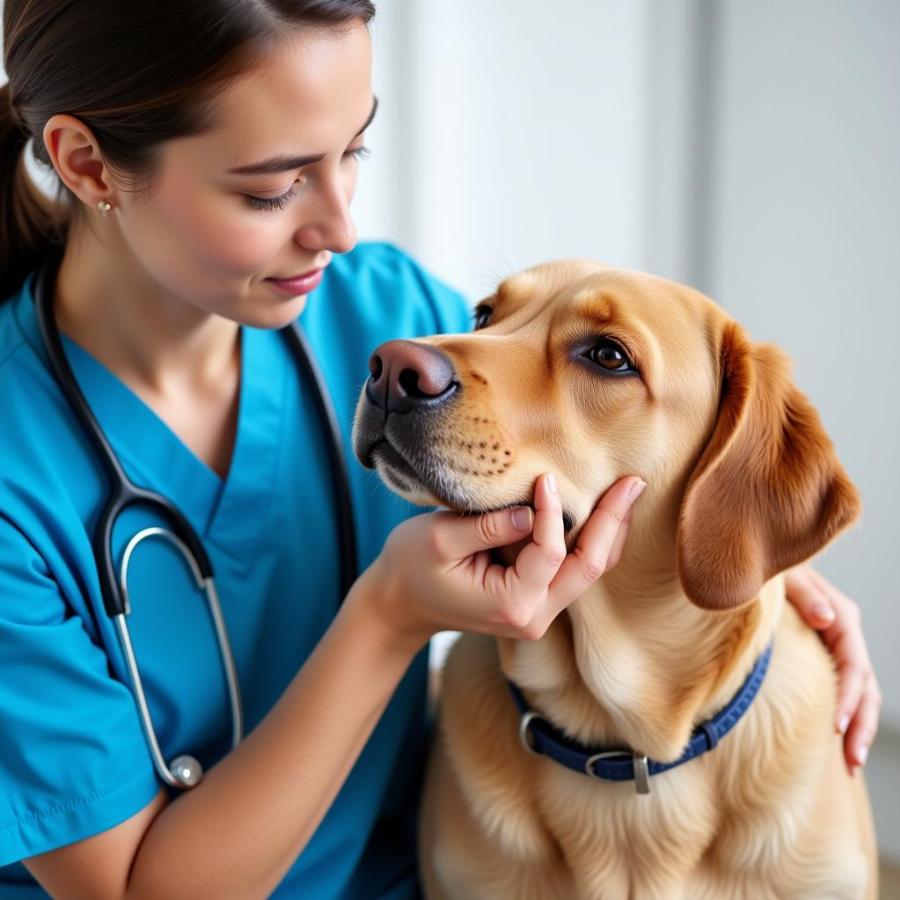As a loving dog owner, you’re probably familiar with the classic wet dog nose. But what does it mean when your furry friend has a dry nose? Is it a cause for concern? While a wet nose is generally considered a sign of good health in dogs, a dry nose isn’t always something to worry about. There are many reasons why a dog might have a dry nose, and not all of them are related to illness.
Debunking the Myth: Dry Nose Doesn’t Always Equal a Sick Dog
Let’s get one thing straight – a dry nose doesn’t automatically mean your dog is sick. Just like us humans, dogs can experience temporary changes in their nose moisture due to various factors like environment, activity level, and even breed.
Common Reasons for a Dog’s Dry Nose
Here are some common reasons why your dog might have a dry nose:
- Dehydration: Just like us, dogs need to stay hydrated, especially during hot weather or after strenuous activity. If your dog is dehydrated, their nose might become dry.
- Sleep: Ever noticed how your own nose feels a bit dry after a nap? The same goes for dogs. During sleep, they produce less tear fluid, which contributes to a drier nose.
- Sunburn: Yes, dogs can get sunburned too, especially those with light-colored noses. Sunburn can cause the nose to become dry, cracked, and even flaky.
- Breed Predisposition: Some breeds naturally have drier noses than others. Brachycephalic breeds, like Bulldogs and Pugs, often have drier noses due to their facial structure.
- Age: As dogs age, their ability to produce nasal secretions may decrease, leading to a drier nose.
When to Worry: Signs of a Problem
While a dry nose in itself isn’t necessarily a cause for alarm, it’s essential to pay attention to other accompanying symptoms. If you notice any of the following along with a dry nose, it’s crucial to contact your veterinarian:
- Loss of Appetite
- Lethargy or Weakness
- Vomiting or Diarrhea
- Discharge from the Nose (especially if thick, yellow, or green)
- Cracked or Bleeding Nose
- Excessive Sneezing or Coughing
These symptoms, coupled with a dry nose, could indicate an underlying health issue that requires immediate attention.
 Veterinarian Examining Dog's Nose
Veterinarian Examining Dog's Nose
Keeping Your Dog’s Nose Healthy
Maintaining your dog’s overall health is key to a happy and healthy nose. Here are some tips to keep your furry friend in tip-top shape:
- Ensure Adequate Hydration: Always provide fresh, clean water for your dog, especially during warmer months or after exercise.
- Provide Shade: Protect your dog from prolonged sun exposure, particularly during peak hours. Use dog-safe sunscreen on their nose if necessary.
- Balanced Diet: Feed your dog a high-quality, balanced diet to ensure they receive all the necessary nutrients.
- Regular Vet Checkups: Schedule regular checkups with your veterinarian to monitor your dog’s overall health and catch any potential issues early on.
What About a Wet Dog Nose?
Now that we’ve explored dry noses, let’s not forget about the classic wet dog nose. A wet nose is usually a good sign, indicating that your dog is producing enough tear fluid, which helps to keep their nose moist and functioning correctly. what does it mean when a dogs nose is wet
Conclusion
A dry nose in dogs can be perfectly normal, but it’s essential to be aware of the potential reasons behind it. By observing your dog’s behavior and looking out for any additional symptoms, you can ensure their well-being. Remember, when in doubt, always consult with your veterinarian for personalized advice. what does it mean if a dogs nose is dry
Beaut Dogs is your go-to resource for all things dog-related, providing reliable and insightful information about the canine world. For personalized advice and support, reach out to us at [email protected]. Let Beaut Dogs help you navigate the joys and responsibilities of dog ownership.